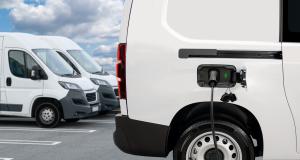Batteries fitted to electric vans will be required to be of high quality and durable over the years thanks to a proposal agreed today by UNECE’s Working Party on Pollution and Energy (GRPE).
The proposal will now be submitted to the UNECE-hosted World Forum for Harmonization of Vehicle Regulations (WP.29) for adoption in June 2024.
It builds on the adoption of the United Nations General Technical Regulation No. 22 providing minimum performance requirements for the battery durability of electrified light-duty vehicles by the World Forum in March 2022.
The proposal sets out two targets for batteries fitted to electric vans. According to the first target, they will be required to last at least five years or 100,000 kilometers, without losing more than 25% of their initial capacity. According to the second target, they will need to last for eight years or 160,000 kilometers, with the maximum battery capacity loss of up to 35%.
The extension of the minimum performance requirements for the battery durability of electric vans comes at the time of exponential growth in the global sales of electric vehicles (EVs) and governments’ increased focus on the electrification of road transport. The European Union and the United States have already made legislative proposals to transpose the UN GTR No. 22 into their regional and national legislations.
According to the estimates made by the Electric Vehicles Initiative, the global sales of electric cars were projected to reach USD 14 million by the end of 2023, accounting for 18% of all new cars sales.
The spread of EV adoption is gaining momentum outside of the major EV markets – China, Europe and the United States – with governments providing incentive financing programmes for component manufacturing, which is driving demand for batteries and related critical minerals.
In addition to increasing consumer trust, the latest decision UNECE’s Working Party on Pollution and Energy will further contribute to the improvement of the environmental performance of electric vehicles worldwide and will ease the pressure on in-demand critical raw materials needed for their production by obliging manufacturers to make long-lasting components.
Work to develop a similar regulatory requirement for heavy duty vehicles is ongoing at UNECE and is expected to be submitted for consideration by the World Forum in the second half of 2024.
Note to editors
The World Forum for Harmonization of Vehicle Regulations, hosted by UNECE, is a unique global platform responsible for the regulatory frameworks regarding the safety and environmental performance of vehicles, their subsystems and parts.
The World Forum manages three Global Agreements on vehicles: 1958 Agreement (UN Regulations); 1998 Agreement (UN Global Technical Regulations); and 1997 Agreement (UN Rules on Periodic Technical Inspections). Any country that is member of the United Nations may participate in the activities of the World Forum and accede to the Agreements.
United Nations Global Technical Regulations (UN GTRs) contain globally harmonized performance-related requirements and test procedures. They provide a predictable regulatory framework for the global automotive industry and consumer associations. They do not contain administrative provisions for type approvals and their mutual recognition.
The Working Party on Pollution and Energy (GRPE) is one of the six subsidiary bodies of the World Forum. It concentrates its work on defining exhaust, energy efficiency and power measurement procedures for all modes of inland transport in order to limit environmental damage. GRPE will be in charge of the development of the UN GTR on real driving emissions testing.


